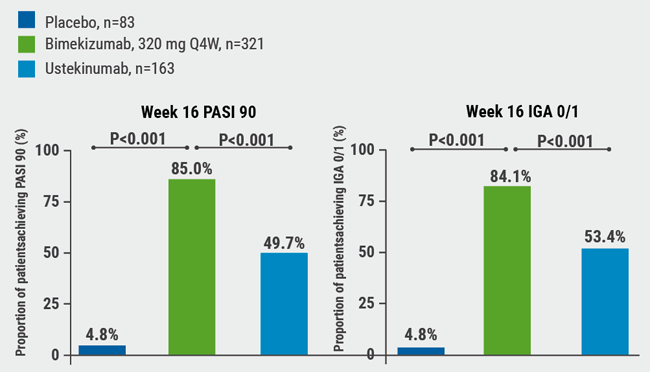“Although we have many efficacious drugs in psoriasis now, it is important to know which drug is used when, and of course, which drug is better than others,” said Prof. Richard Warren (University of Manchester, UK). Thus, head-to head studies are important. In this current head-to-head trial, the IL-23 blocker risankizumab was compared with the IL-17 blocker secukinumab in adult patients with moderate-to-severe plaque psoriasis who are candidates for systemic therapy.
Participants (n=327) were randomised to receive either 150 mg risankizumab at weeks 0, 4, and every 12 weeks thereafter or 300 mg secukinumab weekly from week 0 to 4, and every 4 weeks thereafter. Primary outcome measures were the percentage of participants with a 90% reduction from baseline in Psoriasis Area and Severity Index (PASI 90) at week 16 (non-inferiority margin of 12%) and week 52. Secondary outcomes were the percentage of participants with a 75% and 100% reduction from baseline PASI (PASI 75 and 100, respectively), as well as the percentage of participants with Static Physician Global Assessment (sPGA) score of clear or almost clear skin at week 52.
At week 16, 74% of patients treated with risankizumab achieved PASI 90 compared with 66% of patients treated with secukinumab. The adjusted difference (CI 95%) was 8.2% (-2.2 to 18.6); thus, non-inferiority was met. The difference was even more pronounced after 52 weeks: 87% of patients treated with risankizumab compared with 57% in the secukinumab group achieved a PASI 90 response (P<0.001) (see Figure). In addition, all secondary outcomes demonstrated the superiority of risankizumab (P<0.001).
Figure: IMMerge primary efficacy results over a year: PASI 90 (NRI) [1]

PASI, Psoriasis Area and Severity Index; NRI, non-responder imputation.
* P<0.001 nominal
**P<0.01 multiplicity controlled
Side effects were reported by 71% in both groups, but no new safety signals were detected. Two patients in the risankizumab group and 8 secukinumab patients discontinued the study drug because of an adverse event. Serious adverse events were reported by 9 patients in the risankizumab and 6 patients in the secukinumab arm.
Prof. Warren concluded that the IL-23 blocker risankizumab demonstrated non-inferiority to secukinumab after 16 weeks and superiority after 52 weeks.
- Warren RB, et al. Late-breaking abstract, AAD Virtual Meeting Experience, 12-14 June 2020.
- Warren RB, et al. Br. J. Dermatol. 28 June 2020. DOI:10.1111/bjd.19341.
Posted on
Previous Article
« IL-13 blocker tralokinumab effective in AD Next Article
Good response and pruritus reduction in AD with novel selective JAK1 inhibitor »
« IL-13 blocker tralokinumab effective in AD Next Article
Good response and pruritus reduction in AD with novel selective JAK1 inhibitor »
Table of Contents: AAD 2020
Featured articles
Late-Breaking Abstracts
IL-17A and IL-17F blockade remarkably effective in psoriasis
Good response and pruritus reduction in AD with novel selective JAK1 inhibitor
Novel IL-23 blocker risankizumab highly effective and tolerable in psoriasis
Tape stripping – a painless way to distinguish AD and psoriasis?
IL-4/IL-13 blocker dupilumab effective in children with severe AD
Pembrolizumab leads to higher toxicity risk in obese melanoma patients
Can gene expression help to pick the right biologic to treat psoriasis in cancer patients?
Omalizumab for cancer-induced dermatoses
Psoriasis – What Is Hot?
Psoriasis therapy for children and pregnancies
Biologic psoriasis treatment to lower cardiovascular risk?
Systemic Therapies for Dermatologists
How to manage cutaneous side effects of immunotherapy
Cannabinoids: a future role in dermatology?
Hidradenitis Suppurativa/Acne Inversa
Biologics in HS – a growing armamentarium
Pearls of the Posters
Selective IL-23 blocker safe in elderly psoriasis patients
Spironolactone safe for androgenetic alopecia in cancer survivors
Baricitinib beneficial in head and neck AD
ECLIPSE trial: skin clearance independent of PsA status at baseline
Related Articles
August 6, 2020
Biologic psoriasis treatment to lower cardiovascular risk?
August 6, 2020
Cannabinoids: a future role in dermatology?

August 6, 2020
IL-17A and IL-17F blockade remarkably effective in psoriasis
© 2024 Medicom Medical Publishers. All rights reserved. Terms and Conditions | Privacy Policy
HEAD OFFICE
Laarderhoogtweg 25
1101 EB Amsterdam
The Netherlands
T: +31 85 4012 560
E: publishers@medicom-publishers.com

